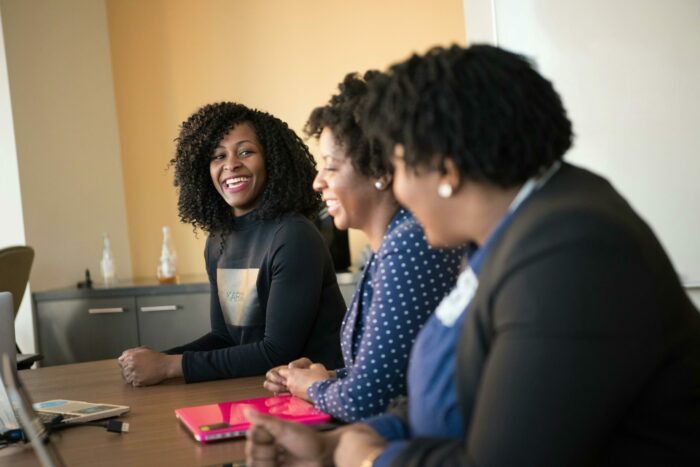Have you ever met someone and almost immediately felt a connection with them? That feeling of ease and comfort in their presence is called rapport, and it’s an essential component of building any successful relationship. Whether it’s personal or professional, the ability to establish rapport can make all the difference. But how do you go about building this connection with others? In this blog post, we’ll explore the art of building rapport – from what it is exactly, why it’s important, to actionable tips on how to build it effectively. So let’s dive right in!
The Art of Building Rapport with Others
What is Rapport?
Rapport is all about connection and understanding. It’s an unspoken bond that develops between two people when they are in sync with each other. In essence, it’s the foundation of any healthy relationship – personal or professional.
At its core, rapport is a feeling of mutual trust and respect that forms between individuals who share common interests, values, and goals. When you have rapport with someone, you can communicate more effectively because there is an underlying sense of familiarity and comfort.
Building rapport requires active listening skills to understand others’ needs and perspectives. You must also be able to display empathy by putting yourself into their shoes. Doing so will allow you to connect on a deeper level which will make your interactions more positive.
The key point here is that rapport isn’t something that just happens overnight; it takes time to develop through consistent effort towards building genuine relationships based on mutual understanding and trust rather than manipulation or superficiality.
The Importance of Rapport
Building rapport with others is crucial for establishing trust and forming meaningful connection:
- When we have a good rapport with someone, we are more likely to be open and honest with them, which can lead to better communication and deeper relationships.
- In personal relationships, rapport helps us build intimacy and understanding. It allows us to connect on a deeper level, share our thoughts and feelings freely, and create lasting bonds that withstand the test of time. Without it, relationships may feel shallow or superficial.
- In professional settings, building rapport is equally important. It helps establish credibility and trust between colleagues or clients, leading to smoother interactions and successful outcomes. A good rapport can also foster teamwork among coworkers by creating an environment of mutual respect.
- Ultimately, the importance of building rapport cannot be overstated. Whether in personal or professional contexts, it lays the foundation for strong connections that benefit both parties involved. By taking the time to develop genuine connections with others through shared experiences and active listening skills, we can cultivate meaningful relationships that last a lifetime.
How to Build Rapport with Others?
Building rapport with others is a crucial skill to possess, whether you’re in business or just trying to make new friends. So how exactly can you build rapport with someone?
- Firstly, it’s important to establish a connection by finding common ground and showing genuine interest in what the other person has to say. This could be through small talk about their interests or hobbies.
- Secondly, try mirroring their body language and tone of voice without coming across as disingenuous. People tend to feel more comfortable around those who are similar to them.
- Thirdly, actively listen and show empathy towards the other person’s experiences and feelings. Avoid interrupting and instead ask open-ended questions that encourage conversation.
- Fourthly, find ways to give compliments or offer help if needed. Show that you care about their well-being beyond just surface-level interactions.
Remember that building rapport takes time and effort. Don’t expect immediate results but rather focus on creating long-lasting relationships built on trust and mutual respect.
The Basic Elements of Communication and Rapport
Communication is a fundamental aspect of building rapport. It involves the exchange of information between two or more people, and it’s essential to build trust and understanding. But how can you communicate effectively?
- The first step is to be an active listener. Active listening means giving your full attention to the person speaking, without interrupting or judging them. It means acknowledging what they’re saying by nodding, using verbal cues like “I see” or “uh-huh,” and asking open-ended questions that encourage them to expand on their thoughts.
- Another critical element of communication is body language. Nonverbal cues such as eye contact, facial expressions, posture, and gestures can all convey messages without words. For instance, maintaining eye contact shows interest in what the other person is saying while slouching portrays disinterest.
- Choosing the right words also plays a vital role in effective communication. Using positive language instead of negative phrases contributes significantly to creating a conducive environment for discussion.
- Finally, having empathy is important when communicating with someone. Understanding the other person’s feelings and attempting to relate to their experiences can help build trust and rapport. When people feel heard and understood, they are more likely to be open and honest in their communication.
By mastering these basic elements of communication – active listening skills, nonverbal cues (body language), and appropriate choice of words – you will be well on your way towards becoming an expert at building rapport with others!
7 Rapport Building Secrets That Make People Like You More
Building rapport is the key to establishing strong relationships with others, whether in business or personal settings. So, how can you build solid rapport with people? Here are seven secrets that will help you improve your rapport-building skills and make people like you more.
- Be genuinely interested in the other person: When meeting someone new, take an interest in them by asking questions about their interests, hobbies, and experiences. Listen attentively to what they say without interrupting or judging them.
- Use positive body language: Non-verbal cues such as eye contact, nodding your head when listening and smiling can convey warmth and friendliness to the other person.
- Mirror their behavior: People tend to like those who are similar to themselves in terms of speech patterns, body language and tone of voice. Mirroring these characteristics can help create a sense of familiarity between two individuals.
- Find common ground: Look for shared interests or experiences that you both have in order to establish common ground early on during your interaction.
- Be authentic: Being genuine is essential when building rapport because it helps establish trustworthiness between individuals.
- Show empathy: Empathy is the ability to understand another’s feelings or emotions from their perspective – showing empathy not only builds trust but also shows respect for others’ thoughts and feelings.
- Follow up after initial interactions: Make sure that after any interaction (whether it be a lunch date or work-related conversation) follow back up later on with additional conversation topics via email/text message etc., this type of effort demonstrates care towards maintaining connections formed during initial meetings.
By following these 7 tips above anyone could become better at building rapport with others – so why not give some of them a try next time around?
The Benefits of Building Rapport
Building rapport with others offers a wide range of benefits that can improve your personal and professional relationships:
- One of the biggest advantages is that it helps create a comfortable environment for communication, which increases trust and mutual understanding between parties.
- When you build rapport with someone, you also establish a sense of connection that fosters positivity and acceptance. This leads to better teamwork, improved collaboration, and increased productivity in any setting.
- Another benefit is that building rapport helps alleviate tension during difficult situations or conflicts. By approaching these challenges with empathy and an open mind, you can effectively resolve issues while maintaining positive relationships with those involved.
- In addition to improving social interactions, building rapport has been shown to have significant mental health benefits as well. Studies suggest that having strong social connections can reduce stress levels and promote overall well being.
- Building rapport allows individuals to connect on a deeper level by establishing trust and fostering positive relationships. The benefits extend beyond just professional success but also contribute to emotional resilience and happiness in life.
What’s the difference between genuine rapport and manipulation?
Building rapport with others can be a powerful tool to establish meaningful relationships, but it’s important to understand the difference between genuine rapport and manipulation. Genuine rapport is built on mutual respect, trust, and understanding, while manipulation is based on deception and self-serving motives.
Manipulation involves using tactics such as flattery or false empathy in order to influence someone else for personal gain. It may involve pretending to share interests or values that are not actually held sincerely. On the other hand, building genuine rapport requires taking an interest in another person’s perspective without trying to change their views.
Manipulation often has a short-term focus on achieving immediate goals rather than fostering long-lasting connections. In contrast, building genuine rapport takes time and effort but can lead to more authentic relationships based on shared values.
It’s important to recognize signs of manipulation when they arise so that you can avoid falling prey to them. By developing your own emotional intelligence and recognizing patterns of behavior in others, you can build stronger relationships based on trust rather than exploitation.
Reasons why Rapport is Important
Building rapport with others is an essential part of any social interaction. It helps to create a sense of trust, understanding, and mutual respect between individuals. Here are some reasons why building rapport is important:
- Firstly, it allows for effective communication as people tend to listen more attentively when they feel connected with the speaker. When there’s a good relationship in place, both parties can express their thoughts and feelings without fear of judgement or rejection.
- Secondly, building rapport enhances teamwork and collaboration within the workplace. Individuals who have established a level of harmony are better equipped to work together towards common goals.
- Thirdly, creating rapport can also pave way for future opportunities such as networking or expanding one’s client base through referrals. People tend to recommend those that they have built strong relationships with.
- Having good interpersonal skills like cultivating rapport increases self-esteem and confidence since positive interactions lead to positive emotions which ultimately leads to higher levels of motivation and productivity.
In summary, building genuine connections with others is crucial in all aspects of life – whether personal or professional – as it fosters open communication channels while promoting mutual growth and development.
10 Example Phrases to help build Rapport
Building rapport with others is an essential part of establishing meaningful relationships. To help you get started, here are ten example phrases that can assist in building rapport:
1. “Tell me more about yourself”: This phrase shows that you’re interested in learning more about the person and encourages them to share their thoughts.
2. “I completely understand how you feel”: Empathy goes a long way in building trust and understanding between two people.
3. “That’s a great point! I never thought of it that way before”: Showing enthusiasm for another person’s ideas demonstrates respect and interest.
4. “What do you think about…” : Asking for someone’s opinion helps establish mutual respect and creates opportunities for open dialogue.
5. “How was your weekend?” : Small talk may seem insignificant, but it helps build positive connections with others by showing genuine interest.
6. “I appreciate your input on this project” : Acknowledging someone’s contributions shows gratitude and builds teamwork skills.
7. “Can I offer any assistance?” : Offering help or support establishes trust while demonstrating kindness towards others.
8. “I’m really looking forward to working with you” : Expressing enthusiasm for potential projects creates a positive atmosphere and encourages collaboration.
9. “That’s a great idea! How can I help?” : Demonstrating enthusiasm for another person’s ideas while offering support shows that you care about their success.
10. “Let me know if there’s anything else I can do” : Offering assistance, even after a task is completed, demonstrates commitment and reinforces the relationship between two people.
11. “If there’s anything else I can do to make this easier for you, please don’t hesitate to let me know.”: This phrase demonstrates empathy as well as willingness to be helpful towards others’ needs.
12. “You have impressive experience in this field.” Complimenting someone on their abilities or accomplishments makes them feel valued which strengthens the relationship bond.
13. “I’m sorry you had to go through that, how can I help?” Acknowledging someone’s struggles and expressing empathy helps create an understanding connection between people.
14. “It was a great meeting/talking with you today”. Ending conversations positively leaves a lasting impression on the other person making subsequent interactions even easier.
Using these phrases when appropriate will show sincerity, cultivate trustworthiness, increase approachability thus creating valuable professional relationships over time.
Why is Rapport Important in Professional Relationships?
Building rapport is crucial, especially in professional relationships:
- It facilitates communication and helps to create trust between individuals, which is essential in business dealings. When people feel comfortable with each other, they are more likely to share information openly and honestly.
- Rapport also allows for effective collaboration and team-building efforts. A good working relationship creates a positive atmosphere that benefits everyone involved. It enhances productivity and job satisfaction while reducing stress levels.
- In addition to these benefits, building rapport can help individuals advance their careers by opening up new opportunities for them through networking or recommendation from colleagues within the industry.
- Furthermore, establishing strong connections with clients can lead to long-term partnerships that result in repeat business over time. This not only generates revenue but also strengthens your company’s reputation as a reliable service provider.
- Rapport plays an integral role in developing successful professional relationships that benefit all parties involved. By taking the time to build genuine connections based on mutual respect and understanding, professionals can foster teamwork and growth opportunities for themselves along with their organization as well as increase their chances of success in the future!
Conclusion
Building rapport with others is truly an art form. It takes time, effort, and dedication to establish genuine connections with people. By following the tips and strategies we’ve provided in this article, you can become a master of building rapport wherever you go. Remember that true rapport comes from a place of authenticity and respect for others. It’s not about manipulating or tricking people into liking us – it’s about creating a sense of trust and connection that benefits everyone involved. Whether you’re looking to build better professional relationships or simply improve your personal interactions with those around you, mastering the art of building rapport is one of the most valuable skills you can cultivate. So start practicing today – who knows where it might take you!
![The Art of Building Rapport with Others [101 Guide] 1 Building Rapport with Others](https://zoets.b-cdn.net/wp-content/uploads/2023/07/pexels-fauxels-3183197-scaled-e1689427001476.jpg)
![The Art of Building Rapport with Others [101 Guide] 2 What is Rapport](https://zoets.b-cdn.net/wp-content/uploads/2023/07/pexels-fauxels-3184416-1-1024x683.jpg)
![The Art of Building Rapport with Others [101 Guide] 3 How to Build Rapport with Others](https://zoets.b-cdn.net/wp-content/uploads/2023/07/pexels-fauxels-3182804-1024x683.jpg)
![The Art of Building Rapport with Others [101 Guide] 4 Rapport Building Secrets That Make People Like You More](https://zoets.b-cdn.net/wp-content/uploads/2023/07/pexels-fauxels-3184420-1024x576.jpg)
![The Art of Building Rapport with Others [101 Guide] 5 What’s the difference between genuine rapport and manipulation](https://zoets.b-cdn.net/wp-content/uploads/2023/07/pexels-fauxels-3182801-1024x637.jpg)
![The Art of Building Rapport with Others [101 Guide] 6 Example Phrases to help build Rapport](https://zoets.b-cdn.net/wp-content/uploads/2023/07/pexels-christina-morillo-1181618-1024x684.jpg)



![Mastering Personality Style Adaptability Tactics [5 Benefits] 10 Mastering Personality Style Adaptability Tactics](https://zoets.b-cdn.net/wp-content/uploads/2024/02/2ojpb-e1709053841881.jpg)
![How to Improve Interpersonal Skills? [6 Steps] 11 How to Improve Interpersonal Skills](https://zoets.b-cdn.net/wp-content/uploads/2024/02/pexels-fauxels-3184357-scaled-e1708708387711.jpg)


![Stress Management Techniques for Administrative Professionals [Best 7] 14 Stress Management Techniques for Administrative Professionals](https://zoets.b-cdn.net/wp-content/uploads/2024/02/pexels-mikhail-nilov-8297240-scaled-e1708541459861.jpg)
![Building Strong Interpersonal Relationships as an Administrator [8 Steps] 15 Building Strong Interpersonal Relationships as an Administrator](https://zoets.b-cdn.net/wp-content/uploads/2024/02/pexels-fauxels-3184285-scaled-e1708540301479.jpg)